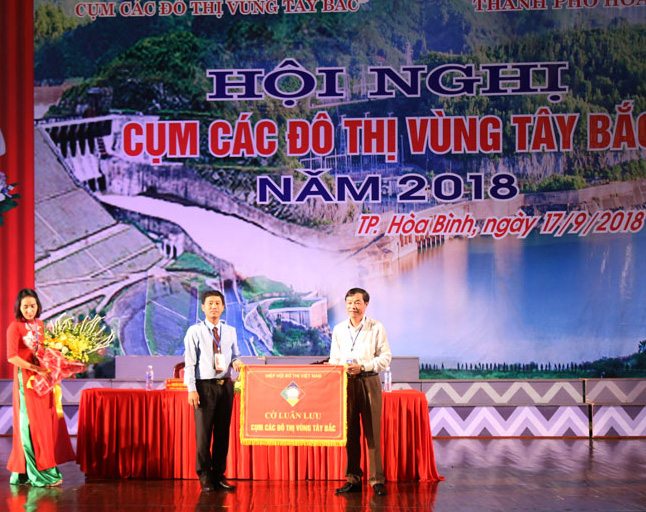
HBO – The People’s Committee of Hoa Binh city has hosted a conference of the cluster of urban areas in the northwestern region in 2018. Attending the event were Tran Dang Ninh, Standing Vice Secretary of the provincial Party Committee and Chairman of the provincial People’s Council; Bui Van Khanh, member of the Standing Board of the provincial Party Committee and Vice Chairman of the provincial People’s Committee; Nguyen Thi Kim Son, Vice Chairwoman of the Association of Cities of Vietnam (ACVN); and representatives from 10 cities and towns in the cluster and Hoa Binh city authorities.
Leader of the
Hoa Binh city People’s Committee hands over flag to Nghia Lo town of Yen Bai
province to host the next event
The cluster of northwestern urban areas comprises eight cities namely Ha Giang,
Son La, Lai Chau, Lao Cai, Tuyen Quang, Dien Bien Phu, Yen Bai and Viet Tri;
and two towns of Muong Lay (Lai Chau) and Nghia Lo (Yen Bai). Themed "Strengthening
State management of land use in urban development”, the conference offered a
chance for urban areas to exchange information, share experience, seek
cooperation opportunities, address difficulties in urban management, and
especially tighten sustainable solidarity among the areas.
Based on the emulation movement of building green, clean and beautiful urban
areas launched by the Association of Cities of Vietnam, the conference selected
five outstanding green, clean and beautiful urban areas in 2018, including Hoa
Binh, Lao Cai, Son La, Ha Giang cities and Nghia Lo town (Yen Bai) and proposed
the ACVN commend and reward these urban
areas.
The conference also discussed and agreed on the theme of action for 2019:
"Improving State management of land use in combination with urban development”,
as well as nominated Hoa Binh as the head of the cluster in 2019 and Nghia Lo
town of Yen Bai province as host of the next conference./.
The Standing Board of the Hoa Binh provincial Party Committee has agreed in principle on a proposal by the Standing Board of the Party Committee of Hoa Binh city to gather feedback on the city’s 1:2000 zoning plan, which forms part of its broader urban development strategy.
Hoa Binh province has made notable progress in public administration reform and digital government development, with the satisfaction index among citizens and businesses reaching over 84%, according to recent government evaluations.
Thanks to great efforts by local authorities in recent times, the governance and public administration performance of Mai Chau district has been significantly improved.
In the afternoon of June 6, the Party Committee, the People's Council, the People's Committee and the Fatherland Front of Lac Son district solemnly held a meeting to celebrate the 139th anniversary of the district's founding (1886–2025) and the 79th anniversary of the establishment of the district's Party Committee (1946–2025). There was the attendance of Mr. Bui Van Thang, the Vice Chairman of the Provincial People's Council; Mr. Quach Tat Liem, the Vice Chairman of the Provincial People's Committee; Ms. Dang Bich Ngoc, the Deputy Head of the National Assembly Delegation of the province; as well as the former leaders of the province and district through various periods, who are the natives of the district.
Implementing the Politburo’s Resolution No. 57-NQ/TW on breakthroughs in science – technology, innovation, and digital transformation is a golden opportunity for the northern mountainous province of Hoa Binh to renew growth model, improve competitive edge and shorten digital gap.
Resolution 57-NQ/TW, issued by the Politburo on December 22, 2024, identifies sci-tech, innovation, and digital transformation as strategic breakthroughs to build a developed and prosperous nation. In Hoa Binh province, this spirit is not just a slogan, it’s being put into action through concrete initiatives that form a "new development triangle”: digital citizenship, digital economy, and digital administration.



